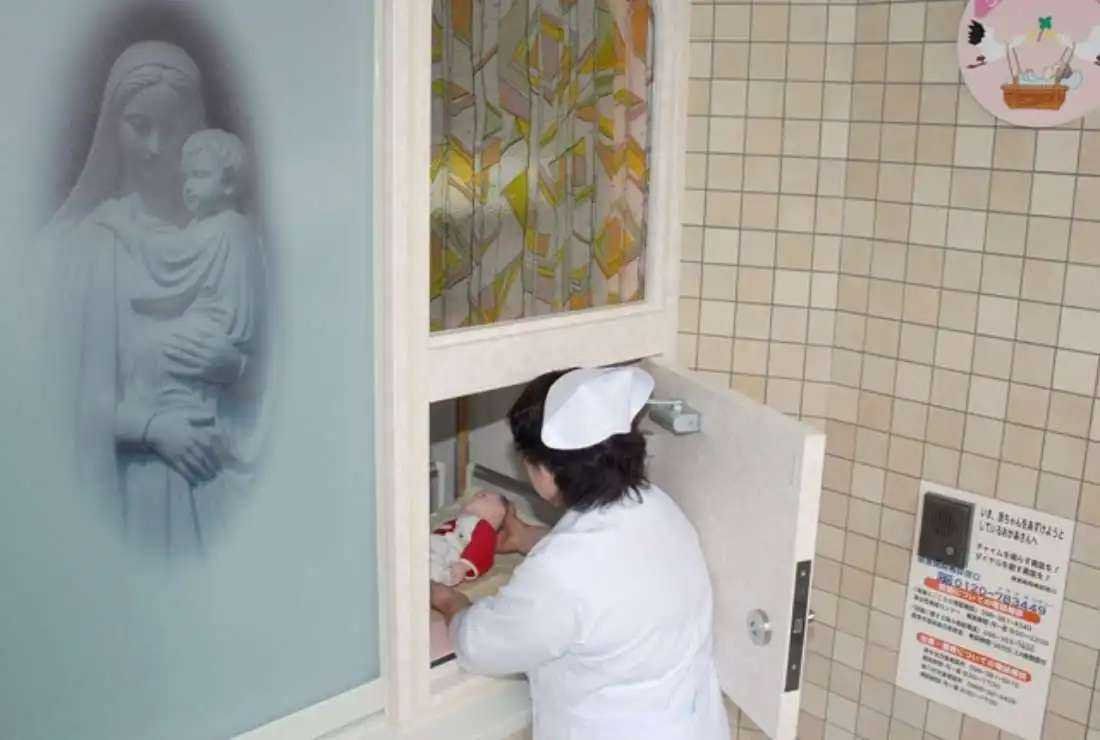
A nurse demonstrates Japan's first 'baby hatch,' where parents can drop off unwanted infants anonymously, during a press preview at the Jikei Hospital in Kumamoto, on Japan's southern island of Kyushu, on May 1, 2007. (Photo: AFP / UCAN files)
Japan is grappling with the heartbreaking reality of infants being born into circumstances that make it challenging for their parents to provide adequate care.
The distressing issue of newborns being abandoned or killed by their mothers has recently come to light, adding to the country's existing challenges of declining birth rates and high youth suicides.
These cases shed light on the need for a comprehensive analysis of the societal factors contributing to this alarming trend.
Recent instances of newborn abandonment and infanticide reveal the desperate circumstances some mothers face, highlighting issues of mental health support, societal pressures, and the isolation experienced by mothers in Japanese society.
The incidents emphasize an alarming disconnect between individuals in distress and available support networks. Factors such as geographic displacement, wherein many women reside in urban centers far from their familial roots, contribute to the problem.
A lack of traditional support structures and close-knit networks can lead to heightened isolation and despair. Additionally, modern relationships suffer from communication breakdowns, further intensifying stress for new mothers.
Heart-wrenching cases of abandonment and infanticide reflect a lack of community engagement and connection, preventing timely interventions.
These recent tragic events emphasize the urgent need for something to be done.
In an effort to address this issue and provide a compassionate solution, a social welfare corporation in Tokyo's Sumida Ward has revealed plans to establish a "baby hatch" at one of its hospitals in 2024.
This initiative aims to create a safe and anonymous space where parents can entrust the care of their infants if they are unable to raise them.
We have previously written about the need for Japan to increase this sort of “safe spaces” as Japan has, as of now, only one baby hatch operated by a medical institution, known as "Konotori no Yurikago," which was opened by Jikei Hospital in Kumamoto in 2007.
The prospective baby hatch in Tokyo, if realized, will become the second of its kind in the country, signaling a growing recognition of the importance of such facilities to support vulnerable infants and distressed parents.
The San-ikukai, a social welfare corporation, overseeing 16 medical and welfare facilities across Tokyo, Nagano, and Shizuoka prefectures, is at the forefront of this compassionate initiative.
The organization plans to set up a baby hatch at San-ikukai Hospital, which boasts obstetrics, gynecology, pediatrics, and other specialized departments, along with a total of 199 beds.
The baby hatch will cater to early infants up to four months of age, and it will be meticulously monitored round the clock by dedicated medical staff.
Additionally, the corporation is considering implementing a confidential birth system, enabling mothers to reveal their identity solely to hospital personnel.
San-ikukai aims to initiate pregnancy counseling as early as April 2024, followed by the implementation of confidential births and, eventually, the establishment of the baby hatch.
Their overarching goal is to save as many babies' lives as possible, emphasizing their commitment to meticulous consultation with administrative authorities and related organizations throughout the process.
Another medical corporation based in Koto Ward, Tokyo, too has expressed intentions to set up a baby hatch. While the specifics are yet to be finalized, these collective efforts reflect a broader societal acknowledgment of the need to support families in distress and provide a lifeline for vulnerable infants.
The establishment of additional baby hatches in Japan represents a significant step forward in ensuring the welfare of infants born into challenging circumstances. These initiatives prioritize the lives of these vulnerable infants while offering support and understanding to parents facing difficult decisions.
The collective efforts of medical institutions, citizens' groups, and administrative bodies underscore the nation's commitment to addressing this critical issue.
Just as important will be the presence of a dedicated social worker to provide emotional and psychological support for the new mothers in distress.
A trained social worker could share the burden of this pivotal life phase, offering guidance and an empathetic ear to help mothers navigate the challenges of motherhood.
By addressing the emotional and psychological aspects often overlooked in traditional approaches, this strategy seeks to provide a more comprehensive and effective support system for vulnerable mothers and their infants.
*The views expressed in this article are those of the author and do not necessarily reflect the official editorial position of UCA News.


